BERLIN (AP) — Beef and chicken glisten as they rotate slowly on vertical spits before they are carved off in razor-thin strips. Two cooks slide from a sizzling griddle to a warm toaster in a practiced dance. Mounds of fresh tomatoes, cabbage and red onions shine in a colorful tableau.
The scene at Kebap With Attitude in Berlin’s trendy Mitte neighborhood is typical of any street-side stand or restaurant where cooks pile the ingredients into pita bread to create the city’s beloved döner kebab.
But the snack's status could be in jeopardy if the European Commission approves a bid by Turkey to regulate what can legally take the döner kebab name.
In the balance is an industry that generates annual sales of roughly 2.3 billion euros (nearly $2.6 billion) in Germany alone, and 3.5 billion euros (nearly $3.9 billion) across Europe, according to the Berlin-based Association of Turkish Döner Producers in Europe.
“From the government to the streets, everyone is eating döner kebab,” Deniz Buchholz, the owner of Kebap With Attitude, said as waiters ferried steaming orders from the kitchen to hungry lunchtime customers on a rainy Monday afternoon.
The word “döner” is derived from the Turkish verb “dönmek,” which means “to turn.” The meat is grilled for hours on a spit and sliced off when the meat becomes crisp and brown. In Turkey, the dish originally was made of lamb and sold only on a plate. But in the 1970s, Turkish immigrants in Berlin opted to serve it in a pita and tweak the recipe to make it special for Berliners.
“They realized that the Germans like everything in the bread,” said Buchholz, who was raised in Berlin and has Turkish roots. “And then they said, ‘OK, let’s put this dish into a bread’ and this is how it came to döner kebab Berlin-style.”
In April, Turkey applied to have döner kebab protected under a status called “traditional specialty guaranteed.” It’s below the vaunted “protected designation of origin” that applies to geographic region-specific products, like Champagne from its eponymous region in France, but could still impact kebab-shop owners, their individual recipes and their customers throughout Germany.
Under Turkey’s proposal, beef would be required to come from cattle that is at least 16 months old. It would be marinated with specific amounts of animal fat, yogurt or milk, onion, salt, and thyme, as well as black, red and white peppers. The final product be sliced off the vertical spit into pieces that are 3 to 5 millimeters (0.1 to 0.2 inches) thick. Chicken would be similarly regulated.
The European Commission must decide by Sept. 24 whether 11 objections to the application, including from Germany’s Federal Ministry of Food and Agriculture, have merit. If they do, Germany and Turkey will have up to six months to hammer out a compromise. The European Commission has the final say.
“We have taken note of the application from Turkey with some astonishment,” Germany’s Federal Ministry of Food and Agriculture said in a statement to The Associated Press.
“The kebab is part of Germany, and the diversity of its preparation methods reflects the diversity of our country — this must be preserved. In the interests of the many fans in Germany, we are committed to ensuring that the doner kebab can remain as it is prepared and eaten here," the ministry said.
It appears that vegetables, turkey and some veal kebabs — all of which are popular in Germany — would no longer be allowed under Turkey's application because it does not specifically mention them, causing confusion in the German food industry.
“The kebab belongs to Germany. Everyone should be allowed to decide for themselves how it is prepared and eaten here. There’s no need for guidelines from Ankara,” Cem Özdemir, Germany’s federal food and agriculture minister who also has Turkish roots, wrote on social platform X.
Buchholz of Kebap With Attitude said he isn’t worried about possible regulations.
Although he said it might be a way to keep the quality high for the traditional döner kebab — he believes it has lapsed in some places — he added that shop owners might have to harness Berlin’s legacy of creative solutions to keep their expanded menus.
“We will go the Berlin way and we’ll find a solution to name it different,” he said, like calling it a “veggie sandwich.”
Döner kebab impacts the political sphere, too. Anger over kebab costs that have risen into the double-digits led the Die Linke, the Left party, to ask German Chancellor Olaf Scholz for a “price break” that would have subsidized the street food and set a maximum price for customers. Scholz declined, but took to social media to explain that increasing food costs come in part from soaring energy costs — which are fueled by Russia’s war on Ukraine.
And German President Frank-Walter Steinmeier engaged in “döner diplomacy” when he brought a third-generation kebab-shop owner, as well as a full skewer of meat, to Turkey in April. The trip was the first official visit there by a German president in a decade, even as Turkey’s populist president, Recep Tayyip Erdogan, is seen as having increasingly authoritarian instincts. Erdogan's reputation has made some Turkish citizens who own kebab shops in Germany fearful of speaking out against the proposed regulations for fear of facing reprisals when they go home.
In its objection, the German Hotel and Restaurant Association wrote that Turkey’s proposals differ from typical German preparations for döner, and that the regulations could lead to economic problems for kebab shops — as well as potential legal challenges.
The German döner kebab economy should not be held to Turkish rules, the association said in a statement.
“The diversity of the kebab must be preserved,” the association said.

People eat doner in the outdoor area of a doner kebab restaurant in Berlin, Germany, Wednesday, Sept. 18, 2024. (AP Photo/Ebrahim Noroozi)
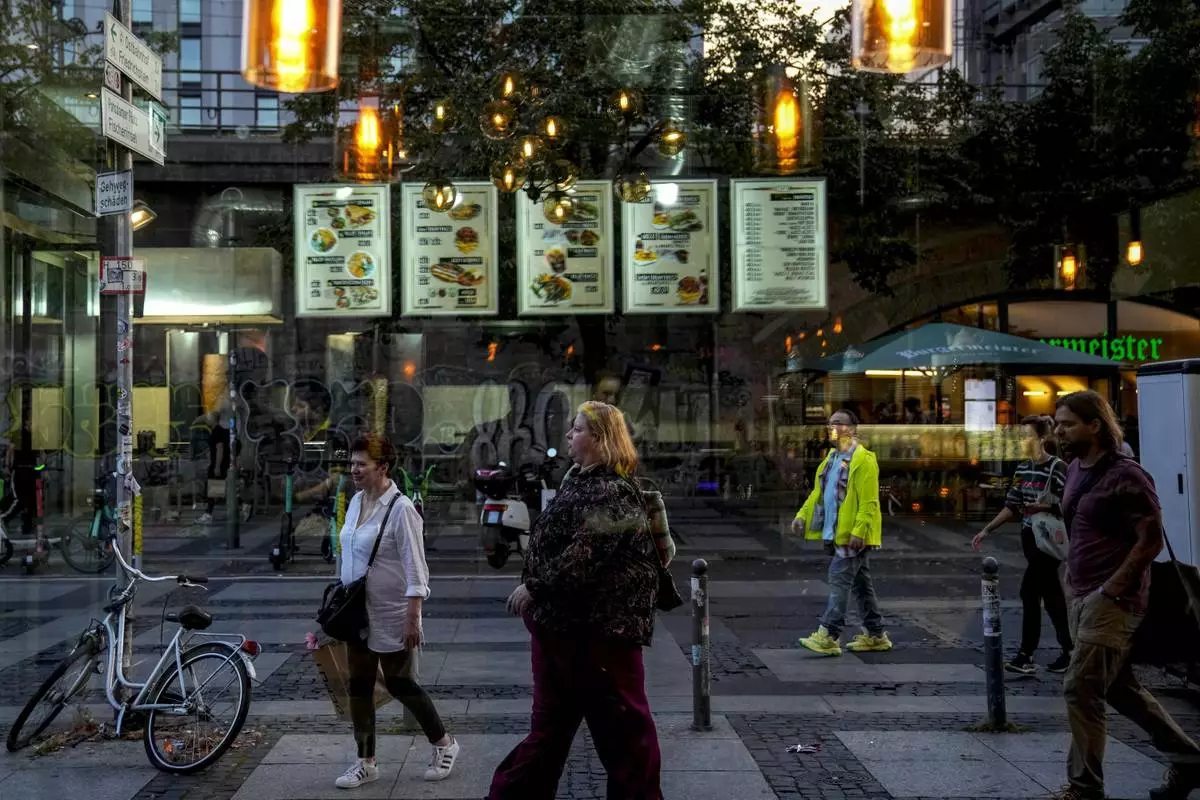
People are seen through the window of a doner kebab restaurant in Berlin, Germany, Wednesday, Sept. 18, 2024. (AP Photo/Ebrahim Noroozi)

People eat doner in the outdoor area of a doner kebab restaurant in Berlin, Germany, Wednesday, Sept. 18, 2024. (AP Photo/Ebrahim Noroozi)
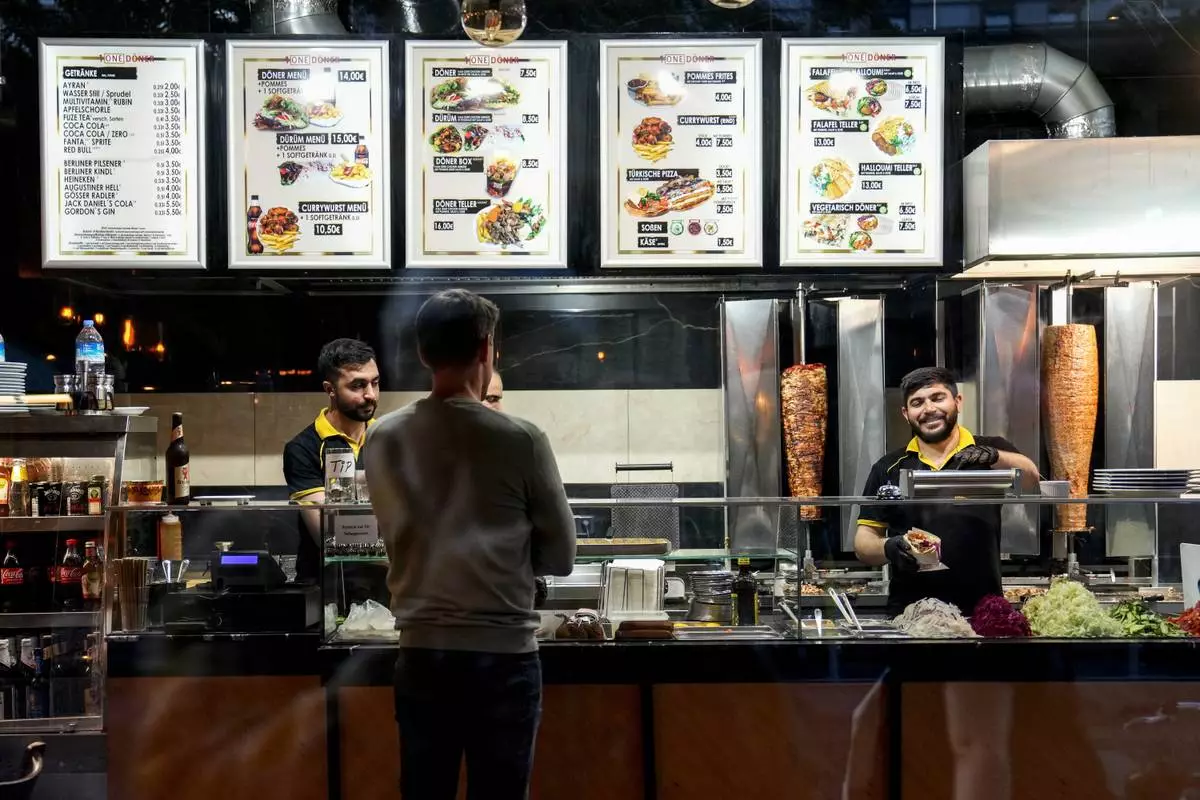
Turkish doner cooks prepare doner kebabs for customers in a doner kebab restaurant in Berlin, Germany, Wednesday, Sept. 18, 2024. (AP Photo/Ebrahim Noroozi)
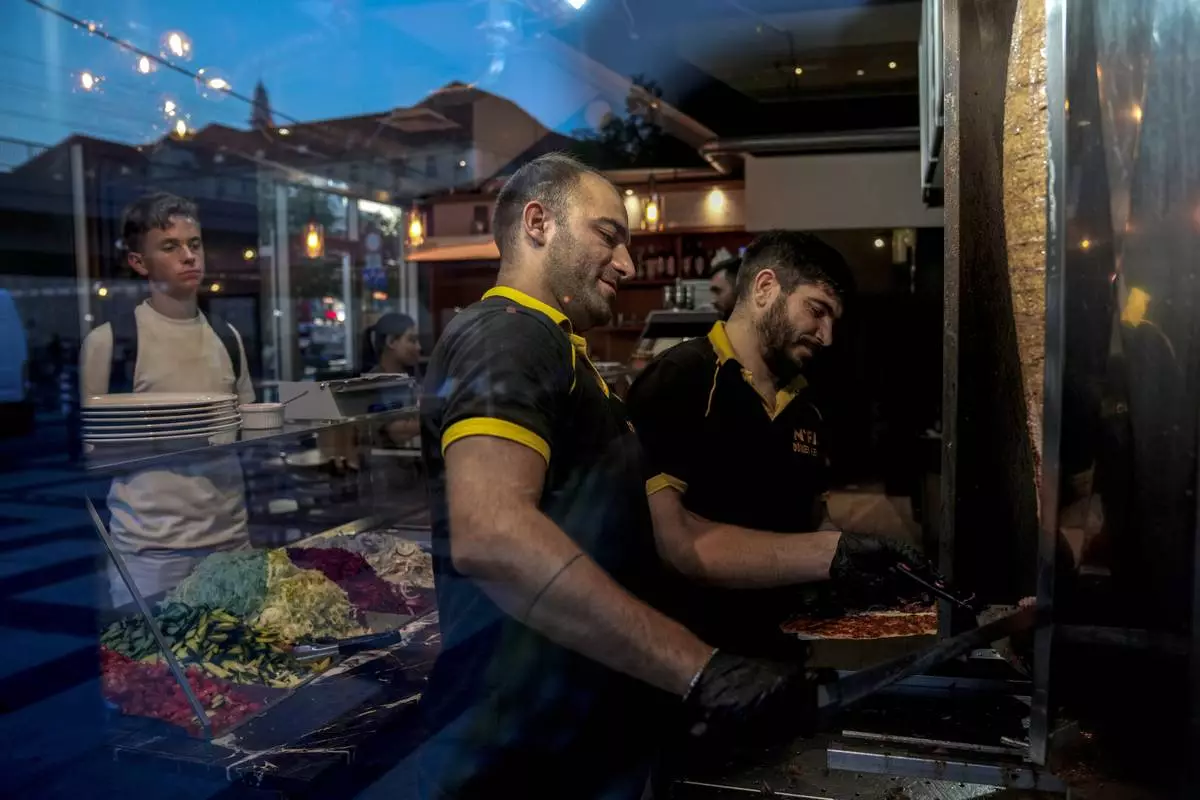
Turkish doner cooks prepare doner kebabs for customers in a doner kebab restaurant in Berlin, Germany, Wednesday, Sept. 18, 2024. (AP Photo/Ebrahim Noroozi)
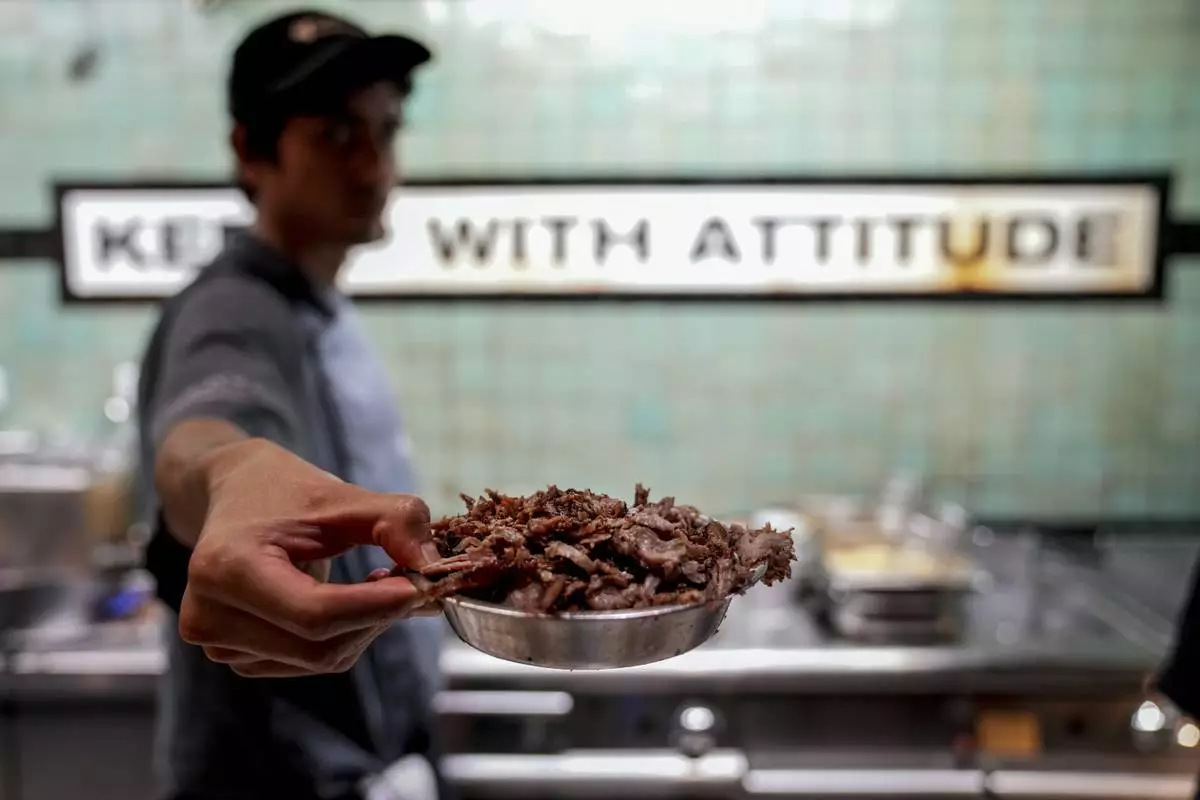
A doner chef prepares doner kebabs for customers in a doner kebab restaurant in Berlin, Germany, Monday, Sept. 16, 2024. (AP Photo/Ebrahim Noroozi)
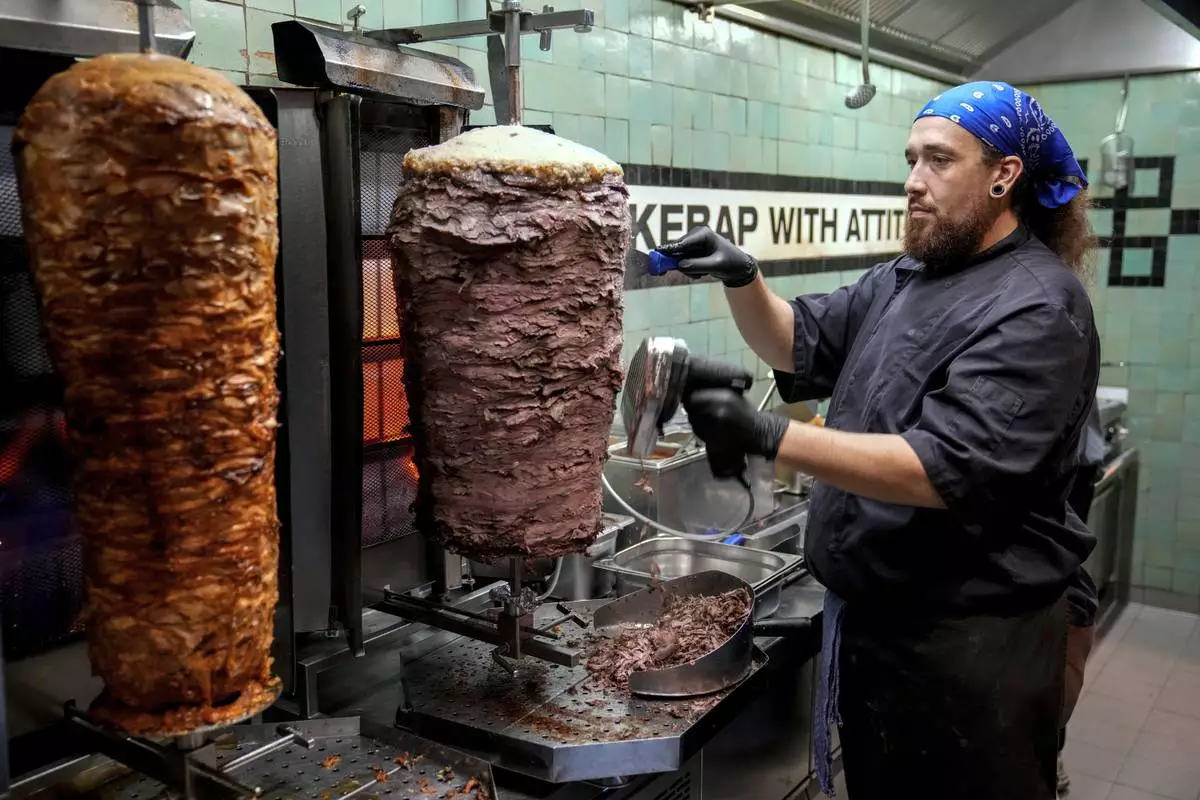
Doner chef Hvesley Silva cuts doner kebab in a doner kebab restaurant in Berlin, Germany, Monday, Sept. 16, 2024. (AP Photo/Ebrahim Noroozi)
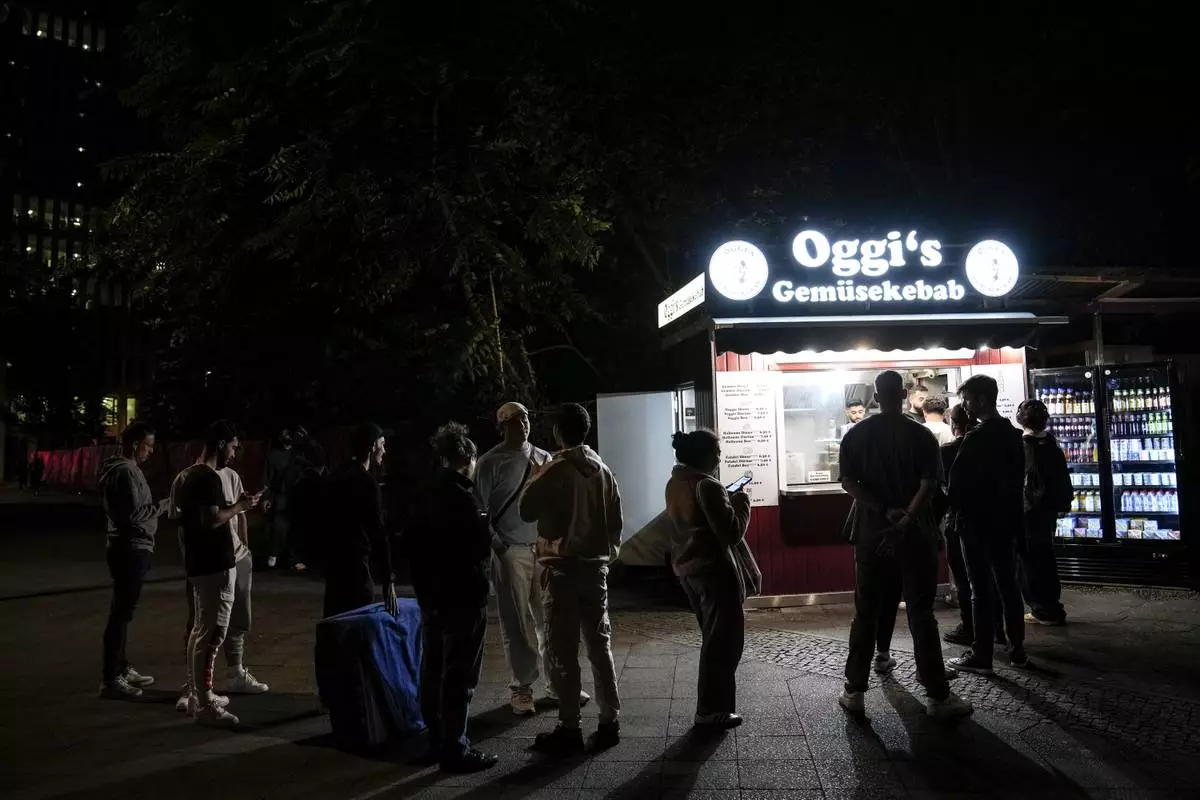
People stand in the line to buy doner kebab in Berlin, Germany, Wednesday, Sept. 18, 2024. (AP Photo/Ebrahim Noroozi)
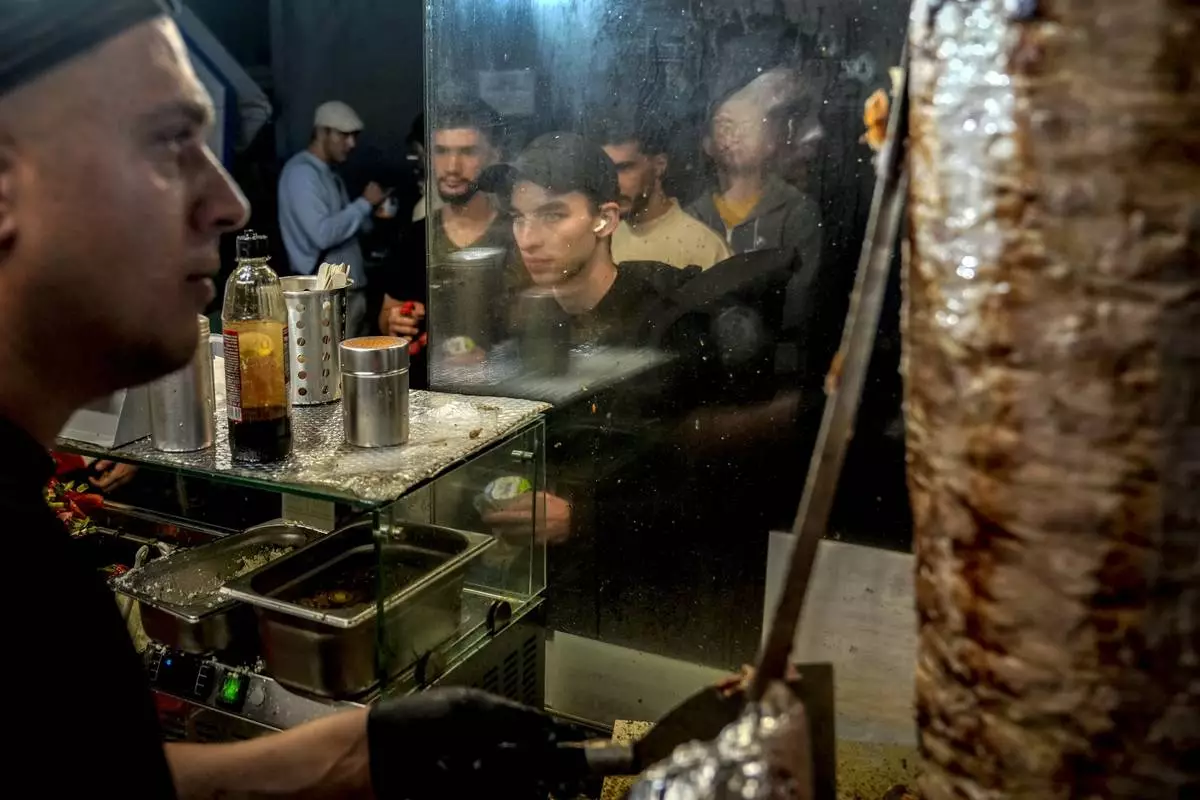
People stand in the line to buy doner kebab while the Turkish cook prepares the doner kebabs, in Berlin, Germany, Wednesday, Sept. 18, 2024. (AP Photo/Ebrahim Noroozi)




























